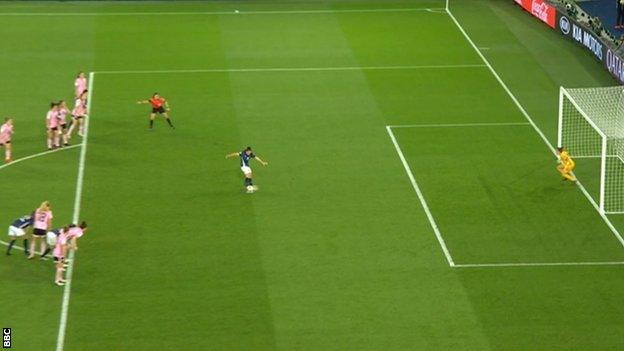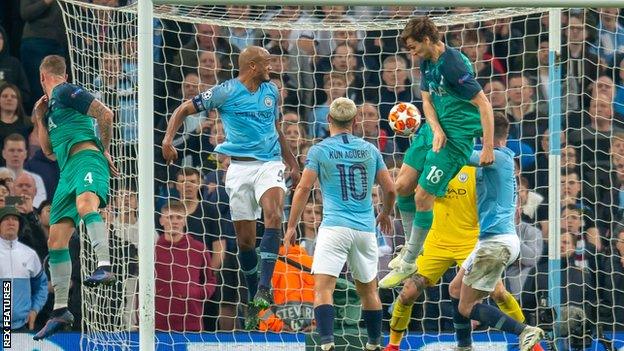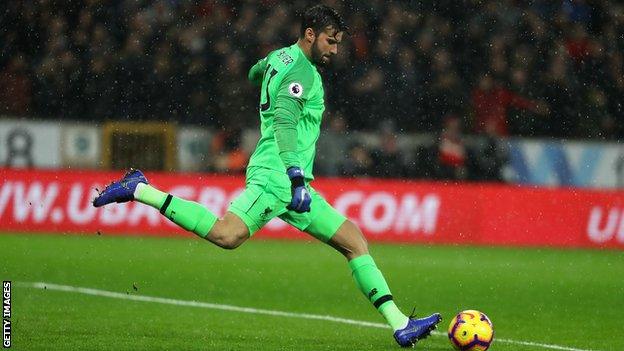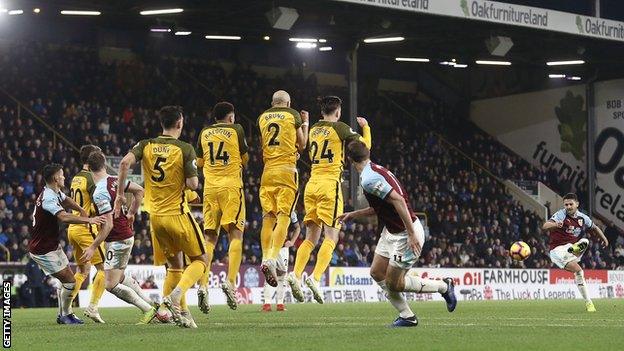Football's new laws: Penalties, backpasses, handballs and subs
- Published

Scotland's hopes of qualifying for the knockout stages in their first Women's World Cup are over
Scotland's Women's World Cup elimination at the hands of Argentina was the second time in three days that one of football's new laws has come under intense scrutiny.
Lee Alexander saved a late penalty but a retake was ordered after the video assistant referee ruled that the Scotland keeper had moved of her line. The game finished 3-3 and Shelley Kerr's side, who had led 3-0 with 16 minutes remaining, were knocked out.
It came just 48 hours after France's Wendie Renard was allowed a second attempt at a missed penalty in the hosts' game against Nigeria. Teenage Super Falcons keeper Chiamaka Nnadozie was adjudged to have moved off her line in saving the Lyon player's effort. Renard stepped up again and scored, a result which threatens Nigeria's hopes of reaching the last 16.
In both cases, the decisions were correct, according to the new laws which came into effect on 1 June and were outlined by the International Football Association Board (Ifab)., external
The change for keepers is one of 12 amendments for fans, referees and players to get used to. Some are quite trivial but, as we are seeing in France, several could make a big difference to the game.
Penalties
Dramatic scenes as VAR penalty retake sends Scots home
As Scotland and Nigeria have found out to their cost, the laws have changed concerning what goalkeepers can do for penalties.
The goalkeeper must have one of his/her feet partly on the goalline (or above it if jumping) when the kick is taken. They cannot stand behind or in front of the line.
During Monday's game, viewers complained that Nigeria's keeper was punished but encroachment into the penalty area by France players as the spot-kick was being taken was not.
The law has not changed on this - and again it seems the officials in that match got the decision right.
The VAR can only penalise "encroachment by an attacker or defender who becomes directly involved in play if the penalty kick rebounds from the goalpost, crossbar or goalkeeper".
In other tweaks to the penalty laws, the kick cannot be taken while the goalkeeper is touching the woodwork or nets - or if the net or posts are still moving after being touched.
One other change means an attacker can take a penalty if they needed treatment (as long as the treatment is quick).
Before now, a player would have to go off the field until after the kick was taken if they needed medical help.
Drop balls
Drop balls can no longer be contested, but the change is more positive than it sounds.
If play is stopped, the ball will be dropped to a player on the team that last touched the ball - and where they touched it. All other players must be 4.5 yards (4m) away.
What that means is if a team's attack is stopped, they will get the ball back in that position - instead of the opponents booting the ball down the field.
However, any play stopped in a penalty area will be returned to the goalkeeper, even if the attacking team had the ball.
Another big change now sees a drop ball awarded if the ball hits the referee and goes to the other team as a result, or if the referee accidentally scores a goal (as happened in the Dutch fourth division, external a week before the law change).
Handballs

Fernando Llorente's goal against Manchester City in the Champions League would not stand under the new laws which say you cannot score with your arm, regardless of intent
The law remains that deliberate handball is an offence. But accidental handball will also be a free-kick if...
the ball goes into the goal off an attacker
a player gets the ball using their arm or hand and then scores, or creates a goalscoring opportunity
a player's hand or arm has made their body "unnaturally bigger"
the player's arm or hand is above their shoulder (unless the player has controlled the ball onto their own arm or hand)
But a handball will not be a free-kick if...
the ball is knocked on to a hand by the player in question or a nearby player
the arm or hand is close to their body and "has not made their body unnaturally bigger"
if a player is falling and the ball touches their hand or arm when it is between their body and the ground to support the body - but not extended to make the body bigger
Another change to the handball rule relates to the goalkeeper.
If the goalkeeper attempts to clear ("release into play") a throw-in or backpass and their clearance fails, then they can handle the ball.
Ifab says this is because "when the goalkeeper clearly kicks or tries to kick the ball into play, this shows no intention to handle the ball".
Goal-kicks

Alisson will have more options to go short with his goal-kicks next season
Another change involving goalkeepers is to goal-kicks, which can now be played to a team-mate who is inside the penalty area.
The law now says the ball is considered in play once the kick is taken. Until now a goal-kick had to be retaken if it did not leave the box.
It could make a big difference to teams like Liverpool and Manchester City, whose defenders could drop into the box to receive a goal-kick from Alisson or Ederson.
Opponents must still remain outside the penalty area until the kick is taken.
Free-kicks

This would be an indirect free-kick to Brighton (in yellow) if it happened next season
When a defending team has three or more players in a wall, the attacking team can no longer place a player in or next to it.
If an attacker is standing within one yard (1m) of the wall when the kick is taken, they will be penalised with an indirect free-kick.
Another change means - similar to the goal-kick change above - if a defending team takes a free-kick in their own area, the ball is considered in play immediately and does not have to leave the box before another player touches it. Again, opponents must remain outside the box.
Quick free-kicks
If the referee is about to show a yellow or red card but the non-offending team takes a quick free-kick and creates a scoring chance, the official can come back and show the card when the ball goes out of play.
Before now, the card would have to be shown before the free-kick could be taken.
However, if the referee had distracted the offending team by starting to show the card, the quick free-kick is not allowed.
Also if the offence was going to be a red card for denying an obvious goalscoring opportunity, but the opposition take a quick free-kick, then the player will only be booked because the other team are considered to have restarted their attack.
Substitutions

We will be seeing less of this in the future, because subs will not always be coming off where the replacement is coming on
A player who is being substituted must leave the pitch by the nearest point on the touchline or byeline - unless the referee says they can leave quickly at the halfway line - or elsewhere for safety or injury reasons.
This change is to stop players time-wasting. Any player who "infringes the spirit of this law" will be booked for unsporting behaviour.
Cards for coaches
A team official guilty of misconduct can be shown a yellow card or red card. If the offender cannot be identified, the senior coach in the technical area at the time will receive the card.
That new system was trialled in the EFL during the 2018-19 season and is now being introduced worldwide.
The other changes
A player can now be booked for celebrating - for removing their shirt or celebrating with the fans - even if the goal is disallowed.
The team that wins the pre-match coin toss can now choose whether to take the kick-off or which goal to attack - previously they could only choose which goal to attack.
There is now a difference between cooling breaks (90 seconds to three minutes) and drinks breaks (maximum of one minute) in certain competitions played in high humidity and temperatures.
Multi-coloured or patterned undershirts are allowed if they are the same as the sleeve of the main shirt.